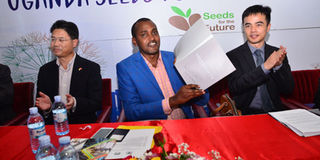Create marketable products, ICT minister tells innovators

Information Technology and Communications minister Frank Tumwebaze (centre) shows off a signed 2016 Huawei Seeds for the Future Memoir at the launch ceremony of the 2017 Seeds for the Future progrwmme at Makerere University last week. Right is Huawei managing director Stanley Chyn, while left is Chief of Mission Chinese Embassy Chu Maoming. PHOTO BY ERONIE KAMUKAMA
What you need to know:
Funding. Shs15b has been tabled before Parliament to support innovations.
Kampala. Information Technology and Communications minister Frank Tumwebaze has said innovators need to provide solutions that can be consumed by the market they are made for.
“We are tired of expo innovations, those that only stop at expos. These bear good innovations but these cannot be taken to the market. We are looking at taking our innovations to the market,” he said.
Mr Tumwebaze was speaking at the launch of the Seeds for the Future programme 2017 at Makerere University last week.
The ministry signed a Memorandum of Understanding with Huawei in April 2016, and the Seeds for the Future programme was one of the activities that were agreed upon.
Under the programme, mentorship of students is to be done through study opportunities experienced such as internship and study trips to China.
Huawei Uganda managing director Stanley Chyn said this year’s focus is to have top 10 students out of the 35 forwarded by all government universities of Uganda.
“We believe that the 10 students in the programme will also enhance their abilities to adapt to the ICT industry as they learn more about state-of-the-art technologies and skills, as well as the innovation needs of the local market. By acquiring skills, students will be able to gain confidence, which helps them to excel in their careers and in multi-cultural business environments,” Mr Chyn said.
According to Huawei public relations director Patrick Tong, contestants will submit proposals on “how to accelerate the development of Uganda through ICT” and the best 10 for the programme shall travel to China for two weeks.
The Seeds for the Future programme is in line with Uganda’s digitisation strategy according to Mr Tumwebaze. He said the programme will help cultivate and pool together ICT professionals and students that are crucial to industry development. “This helps in boosting ICT industry growth, driving the development of different sectors and contributing to lower unemployment rates over the long term,” he said.
Shs15b fund
Meanwhile, Mr Tumwebaze has revealed that the Information, Communication and Technology ministry have tabled a Shs15b innovation support framework paper before Parliament to support innovation in the country.
He said his ministry wants to put money aside to support ideas that generate solutions for problems enfaced by Ugandans.
“Effective July, we shall be having some money and we shall ask the young bright ones to submit their innovations. We shall also have individuals and companies to help mentor our young talents. Without mentorship ICT research and development cannot move forward,” he said.
Mr Tumwebaze said Uganda has seen tremendous growth in the ICT sector because of the enabling environment which has allowed growth.
He added that government is committed to supporting innovations provide solutions for other sectors through use of ICT.
He was speaking during a high level gathering of key ICT decision makers from across Africa in Munyonyo last week designed to support the continued growth of telecoms and ICT in Africa. The two-day agenda explored h
ow governments, large enterprises and service providers can utilise new technologies to improve
The programme
The Seeds for the Future programme was globally launched in 2008. The programme seeks to collaborate with local governments, higher education institutes, and other organisations to select top university students and young government officials working in ICT-related departments in order to offer them valuable opportunities to study and gain work experience at Huawei’s headquarters in China.




